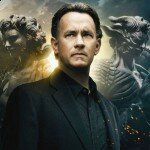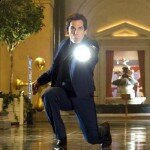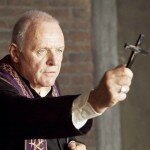Angels and Demons is a lot like Limbo, a place that exists between cinematic heaven and hell where the audience is suspended for two and a half hours. It’s not all that thrilling, yet nor is it a complete bore. The characters are hardly engaging, yet nor are they unlikeable. It’s not in the least bit convincing, yet neither does it really try to be. In the same manner as The Da Vinci Code, Angels and Demons is neither bad nor good, it just is. When you consider the talent involved, ‘just is’ just isn’t good enough.
When four cardinals are kidnapped from the Vatican just before the papal conclave is to elect the new Pontiff, Swiss Guard Commander Richter (Stellan Skarsgård) reluctantly calls upon the help of Harvard Symbologist Robert Langdon (Tom Hanks) to find them before they are murdered one by one. The capturers claim to be part of the Illuminati brotherhood, which strongly opposed the Catholic Church back in the 1700′s before being forced underground into a secret society. With the help of biophysicist Vittoria Vetra (Ayelet Zurer), who reveals that the anti-matter stolen from the Large Hadron Collider in Switzerland is to be used by the terrorists for a highly explosive finale, Langdon must race against the clock to save the cardinals and prevent the destruction of the Vatican City.

|
Angels and Demons is really a giant advertisement for tourism in Rome, as it mostly sees Academy Award winner Tom Hanks run around from historical location to historical location pointing excitedly at maps and statues. This makes it not too dissimilar to National Treasure, which also saw an Academy Award winner run about historical locations doing much the same. Whilst Tom Hanks certainly has held onto his credibility better than Nicolas Cage, the latter film is possibly more exciting and engaging than the former. Why? Because it has simple fun without taking itself too seriously, something that Angels and Demons dips in and out of doing. Using a factually flawed history lesson as its basis, the film attempts to convince using a preposterous plot that is about as holey as the Pope is holy. There is also limited intrigue as the narrative unfolds exactly as it was first declared, which seems odd for a film based around a secret society. Sure, The Da Vinci Code might have been overly muddling, but it did at least play out in a more varied and unexpected fashion. In Angels and Demons however, Langdon merely follows the direction a statue points, leading him to another church where another cardinal is about to meet his maker. Rinse, repeat…yawn.
To be fair, director Ron Howard does manage to create some moments of excitement using dynamic cinematography and an ostentatious soundtrack. The camera incessantly circles the cast like they have their own orbit, possibly masking the fact that not much is really going on. Howard also does well at misleading the audience as to the identity of the villain, making for one giant game of Cluedo that partly makes up for the narrative monotony.
The tightly packed script gets away with scarcely developing Hanks’ character, given the expectation that you have watched or read The Da Vinci Code, but that’s no excuse for not at giving an ounce of depth to the new supporting cast. Solid performances all round cannot hide the fact that most characters exist only as possible suspects in the whodunit mystery. Ayelet Zurer’s effort as Vittoria is a pointless plus one to Langdon throughout the film, as is Pierfrancesco Favino as his Swiss Guard escort. The tension between Ewan McGregor and Armin Mueller-Stahl cardinal characters (pictured) is perhaps the films greatest strength, despite their limited screen time together. Also underplayed is the intriguing clash between science and religion, where the film opts to sit on the fence to avoid upsetting potential box office sales from either camps.
Ultimately, Howard has made a film that will achieve exactly what The Da Vinci Code did; make a bucket load of money at the expense of being an interesting film.
Verdict:
As its title suggests, Angels and Demons is mix of the good and the bad. Whilst Ron Howard has made a more stylish and structured film than The Da Vinci Code, he still hasn’t quite figured out how to make exciting or engaging.
 Follow the author Anders Wotzke on Twitter.
Follow the author Anders Wotzke on Twitter.















